General
Freshers tipped on academic excellence, finances, career development, Emerging Leaders Program
Published
2 years agoon
By
Mak Editor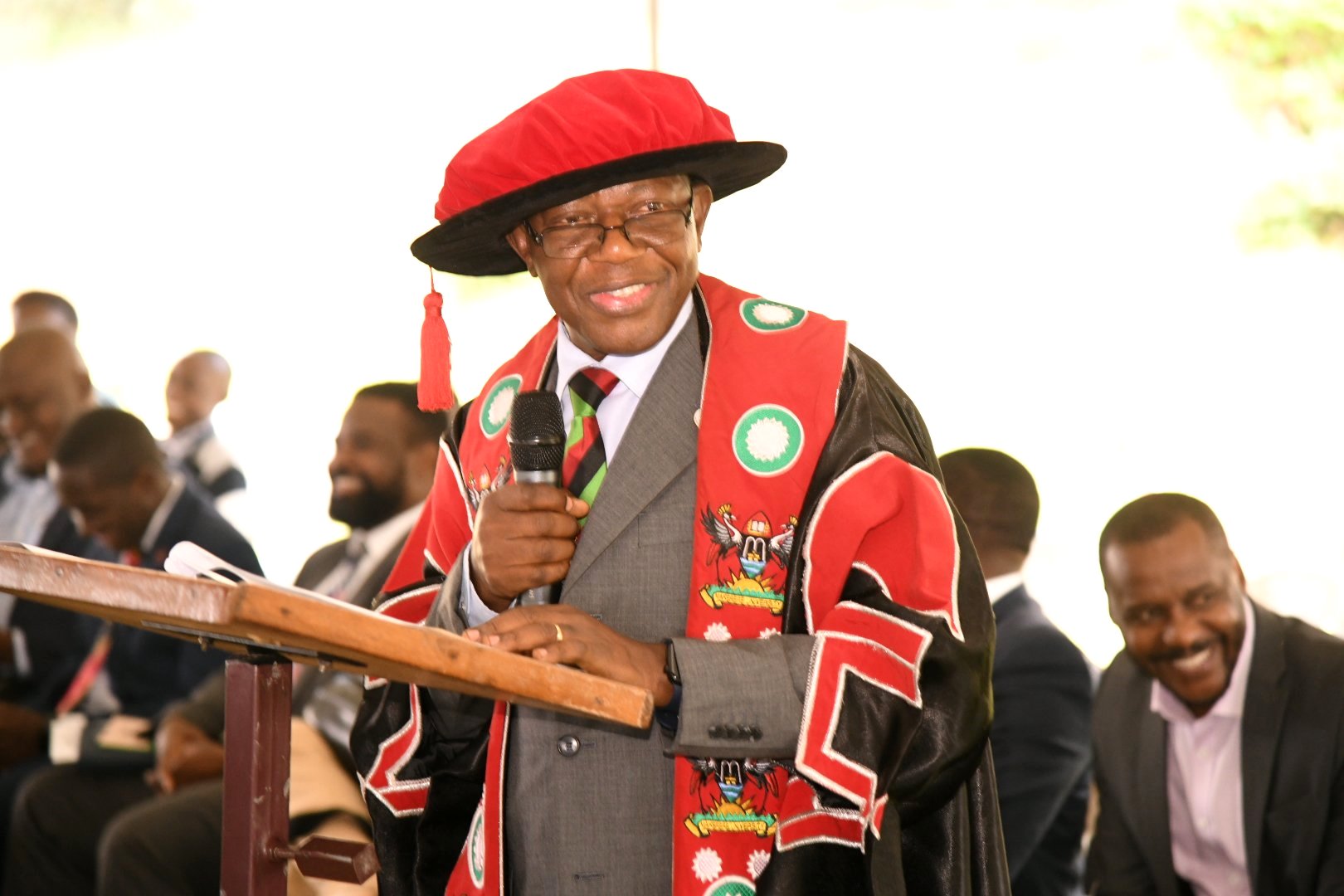
By Gerald Ochwo
On 5th August, 2024, the Office of the Academic Registrar, organized a Central Orientation briefing for all the freshmen and women of the 2024/2025 Academic Year intake. The orientation briefing provides a central platform where the newly admitted students are taken through a wide range of issues that directly relate to their day-to-day lives by various officials at the University. Held at the Freedom Square, this year’s orientation attracted the participation of thousands of Ugandan and International students.
In his welcome remarks, the Academic Registrar, who also doubles as the Acting Deputy Vice-Chancellor, in-charge of Academic Affairs, Prof. Buyinza Mukadasi, congratulated the students upon successfully going through the rigorous admission process of Makerere University, where only the best are admitted. He noted that Makerere University is still among the few prestigious and most admired higher institutions of learning on the African continent and beyond. He signaled to the new students that their arrival at Makerere University was the beginning of a new chapter in their life, where they will now have the opportunity to determine the next direction and course of their lives.
With regard to Academic life, Prof. Buyinza assured the students that Makerere University will provide all learning opportunities, where the students will get to learn new things, acquire new knowledge, and grow new competencies that will equip and shape their character as they become reliable and grounded professionals.
“We want you to achieve your academic and personal potential, to develop networks of friends, new interests and life skills. In order to achieve this we recommend that you work hard; find time to relax; and make use of the support services that are available to you.”~ said Prof. Buyinza Mukadasi.
He emphasized that academic success can only be attained by students when they avoid certain lifestyles and choices such as; moving with huge sums of money and moving late in the nights. Prof. Buyinza advised that they should instead abide by the university policies and guidelines, as well as prioritize enrollment and timely registration.
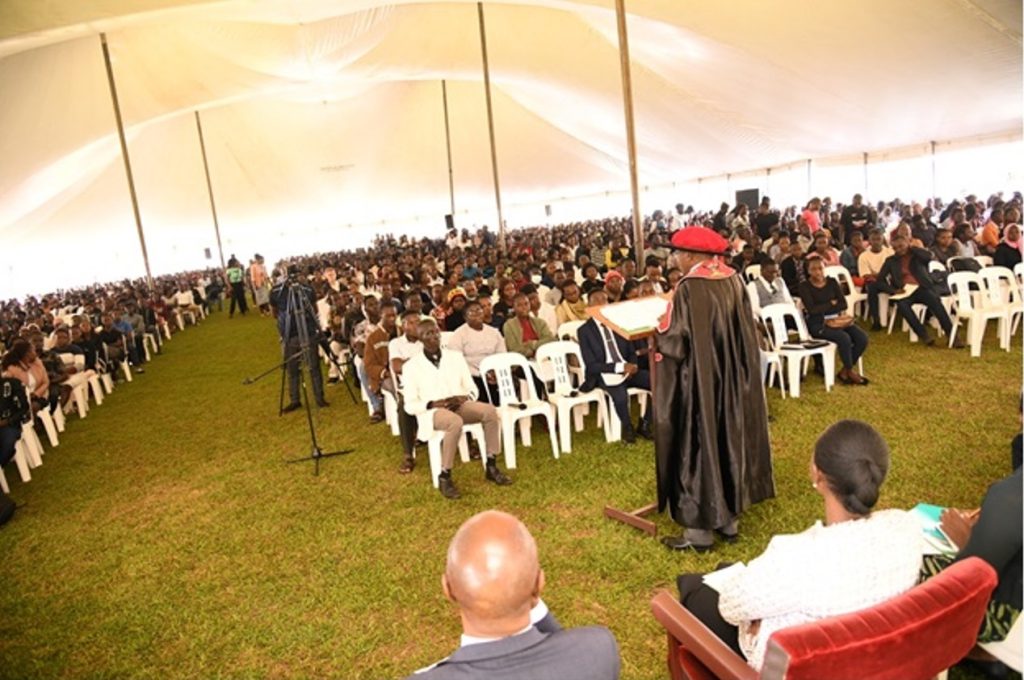
In his concluding remarks, the Acting Deputy Vice-Chancellor (Academic Affairs) and Academic Registrar, called upon the new students to avoid distractors, always focus on what brought them to Makerere University, be good time managers, exploit their talents, map out their future careers, embrace diversity and take good care of themselves. He reiterated the University’s commitment to provide an intellectually and socially vibrant environment for academic excellence, provided the students on their part observe good finance management of their tuition.
“In you, I see vibrant young people with a lot of energy and enthusiasm. I hope that you will use the energy you have to your best for the benefit of yourselves and humanity. We want you to thrive and succeed here, academically, socially and personally.”~ Prof. Buyinza Mukadasi noted.
In his communication, the Acting Deputy Vice-Chancellor (Finance and Administration), Prof. Henry Alinaitwe, who also represented the Vice-Chancellor at the event, took a moment to unveil the ‘Emerging Leaders Program’, a campaign being championed by the First Lady and Minister of Education and Sports, Hon. Janet Kataaha Museveni. The program focuses on promoting and cultivating a safe and healthy mindset change amongst young people, including University students. He noted that the core objectives of the program are to empower tomorrow’s future leaders in achieving; a sexually fortified youth, an addiction free generation, financially faithful and education focused. The Emerging leaders program is being implemented jointly by the Advancement Office under the Office of the Vice-Chancellor and the Students’ Guild Office. The program is currently running an open fair campaign at the Freedom Square for one week, to raise awareness among the first year students on; HIV Counselling, Testing and Treatment, Life skills, Sexually Transmitted Infection (STI) and Pregnancy prevention, counselling, and mentorship among others.
Prof. Alinatiwe reiterated Prof. Buyinza’s message on finance management. He noted that a number of students receive tuition from parents/guardians but instead choose to divert it into other activities with the hope of realizing a multiplier effect. He emphasized that this vice has over the years landed a number of students into problems including dropping out of the University. He further added that the University will not hesitate to cancel all the provisional admissions of those students who will not have registered within the first two (2) weeks of the semester as stipulated by the Freshers’ Joining Instructions.
“I want to stress the issue of fees and tuition payment. Please note that it is only after you have fully registered with the University, that you will be regarded as a bonafide student of Makerere University. Those of you who are still having tuition and you are pondering on when to pay, after this orientation briefing, please go and bank the tuition. The temptation of diverting that money into other unproductive ventures is so high”~ Prof. Alinaitwe advised.
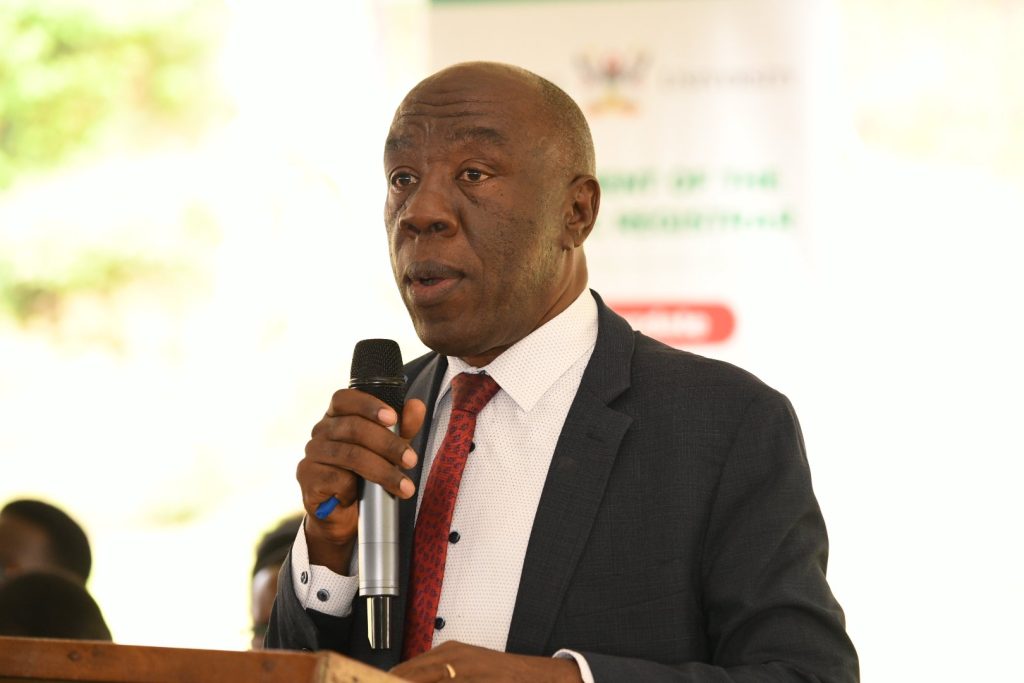
He concluded by congratulating the students upon their admission and reminding them that at the University, there is no central bell and therefore, personal time management is entirely an individual responsibility. Prof. Alinaitwe further urged the students to make all the necessary inquiries on academic related issues within the College structures.
“In case you have academic related issues, go to the Principal or Deputy Principal, the College Registrar or School Dean. Avoid finding yourselves on the wrong side of the law and other cases of indiscipline, which could eventually lead to your expulsion from the University,” Prof. Alinaitwe cautioned.
The central orientation briefing was also attended by the current Guild President, H.E. Lubega Nsamba and his Guild cabinet. The Guild President emphasized that Makerere University was the best place for each student to realize their potential and that they should take advantage of it. He noted further that this is the time for the students to start putting their life desires into practice.
“I implore you all to start putting in practice what you intend to become. I personally, got elected into the Office of the Guild President just after 2 semesters of my study. This is because Makerere University provided me with a platform to start practicing what my heart had desired for many years. You too can become the Nsamba of tomorrow” ~ the Guild President said.
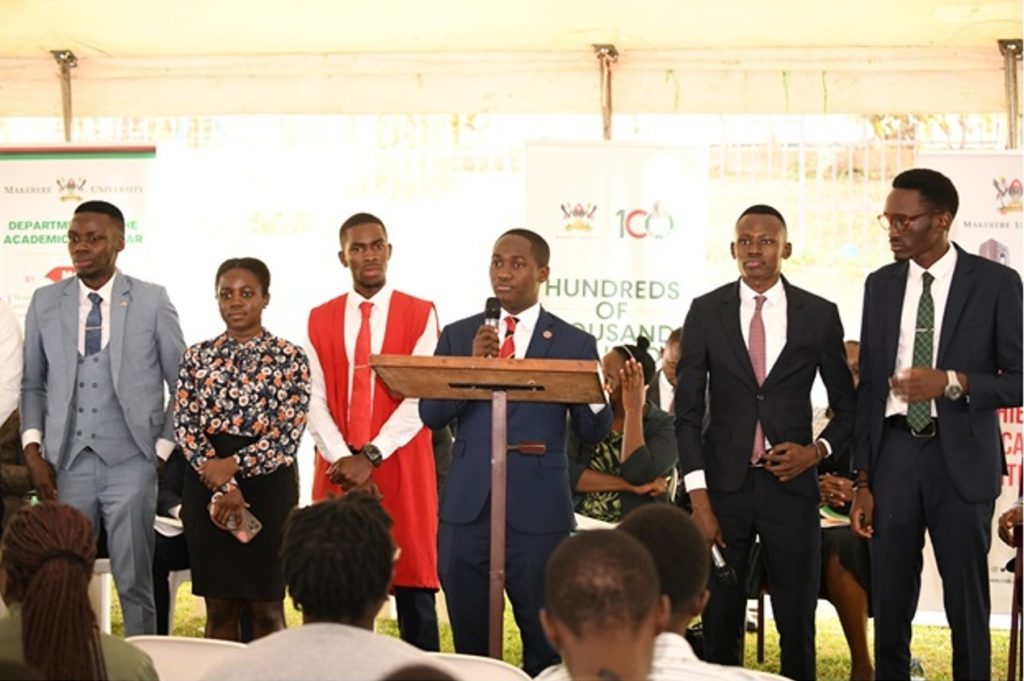
The Dean of Students, Dr. Winifred Kabumbuli, encouraged the students to maximize their stay at Makerere University by engaging in meaningful practices including games and sports. She informed the students that the Office of the Dean of students, is in-charge of the students general welfare including, meals, accommodation, and the places of worship. She also informed the students on the new initiatives that have been spearheaded by the Office of the Dean of Students such as; the creation of the Disability Support Unit, which is currently situated in the Frank Kalimunzu, Central Teaching Facility. She added that a desk has also been created under the Students Work Scheme. This scheme, she said, supports students in job placement and skills enhancements.
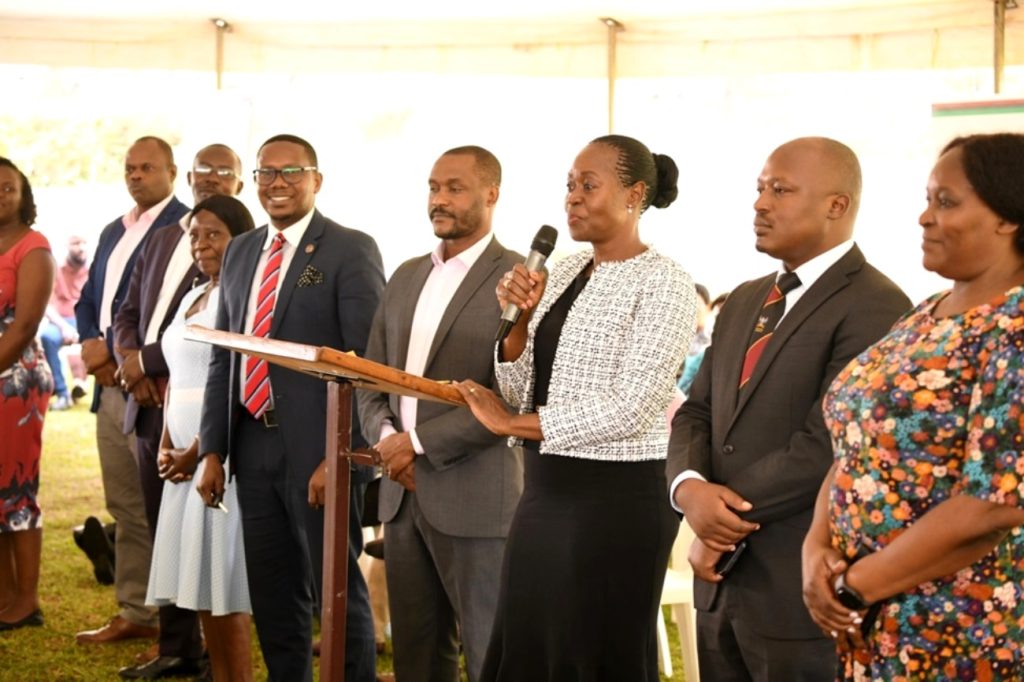
Other Units of the University that participated at this year’s orientation briefing included, the University Library that was represented by the University Librarian, Dr. Ruth Nalumaga. She called upon students to register with the Makerere University Main Library and the College Libraries in order to be able to access Library services, and urged them to attend the Library orientation sessions set to start this week.
The University Hospital officials equally encouraged the students to register with the hospital in order to access the services that are provided at the University including safe male circumcision.
From the University Guidance and Counseling Center, the Manager, Mr. Henry Nsubuga, advised students to seek counseling at the centre as often as the need may arise. The students also received further tips from the Principal Games Tutor, Ms. Peninah Kabenge, who shared with the students on the different Games and Sports activities that the University Offers and encouraged them to visit and register with the sports Office. She also encouraged the students to participate in the forthcoming #MakRun2024, scheduled to take place on the 18th August, 2024, at the Freedom Square, Makerere University.
Representing the University Bursar, Mr. Evarist. Bainomugisha, Mrs. Jackie Ayorekire, advised the new students to get enroll on the ACMIS system and generate a Payment Reference Number (PRN) and pay tuition on time. She cautioned them on the University fees policy and the need to follow to the dot the policy.
“Fees payment is due on the first day of your arrival at the university. Please make time and pay tuition on time and avoid having excuses at the time of examination. Remember you are only regarded a student of Makerere University after you have been registered. No student is registered without tuition payment” ~ Mrs. Ayorekire said.
The Chief Security Officer, ACP Musani Michael Sabila cautioned the students to avoid bandwagons and always remember that they came to the University alone and therefore, any unlawful activities that they participate in will have individual repercussions.
“Please abstain from unlawful activities like strikes, demonstrations and riots on campus. I also caution you to avoid coming back to campus during night hours. The Gates of Makerere University are closed by mid-night and no one is allowed to come into the campus by that time” remarked ACP Sabila.
Mr. Samuel Mugabi, the Director Directorate for ICT Support (DICTS), urged the students to quickly open University email accounts in order to access university electronic services such as internet and e-learning materials. He noted that DICTS provides assistance on all issues related to enrolment, registration and examination permits among others. In the same vein, Mr. Arthur Moses Opio in-charge of End User Support, encouraged the students to reach out to DICTS through the twitter handle: @DICTSMakerere and the Academic Registrar’s Twitter handle: @MakerereAR and via helpme@dicts.mak.ac.ug and the Main University Twitter handles.
Representing Gender mainstreaming, Ms. Suzan Mbabazi, urged the fresh students to be aware of sexual harassment and report any form of such vices to the relevant offices including, the Directorate of Gender Mainstreaming situated at the Senate Building, Level 4. She encouraged the students to acquaint themselves with the Makerere University Policy and Regulations against Sexual Harassment including the Anti-Sexual Harassment Policy.
“Makerere University has the Anti-Sexual Harassment Policy which clearly defines ground that constitutes sexual harassment and the same policy, provides in details on whom you should contact and where to go in case you are harassed”~ she said.
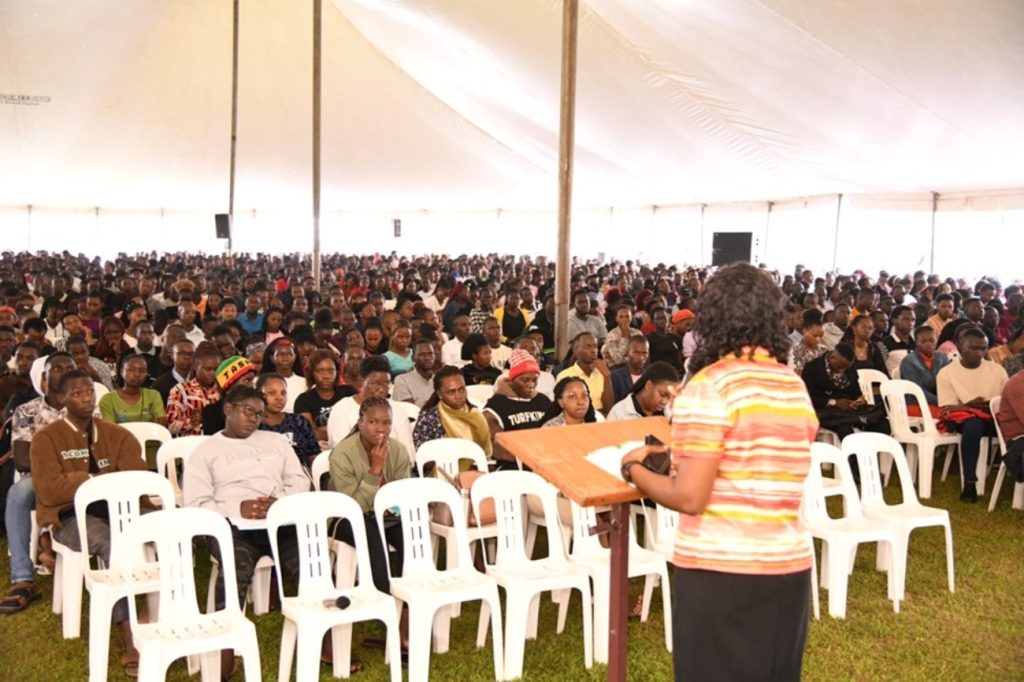
Gerald Ochwo is the Senior Assistant Registrar in–Charge of Communications & Liaison Office of the Academic Registrar
You may like
-


Makerere Graduation Underscores Investment in Africa’s Public Health Capacity
-


Celebrating Academic Excellence: CoBAMS Presents 975 Graduands at Mak 76th Graduation Ceremony
-
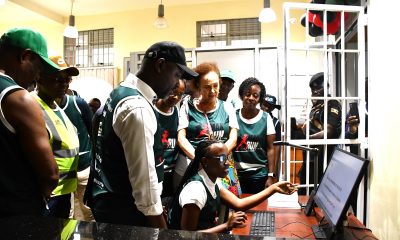

Students empowered to thrive through the Semester
-


Olivia Nakisita and the Quiet Urgency of Adolescent Refugee Health
-


For Youth by Youth – Call for Second Cohort Applications
-
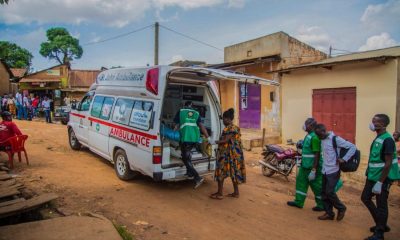

Holding the System Together During COVID-19: Steven Kabwama’s Research on Care Continuity
General
Makerere Explores Strategic Industry Partnership with Psalms Food Industries to Strengthen Manufacturing Innovation
Published
13 hours agoon
March 4, 2026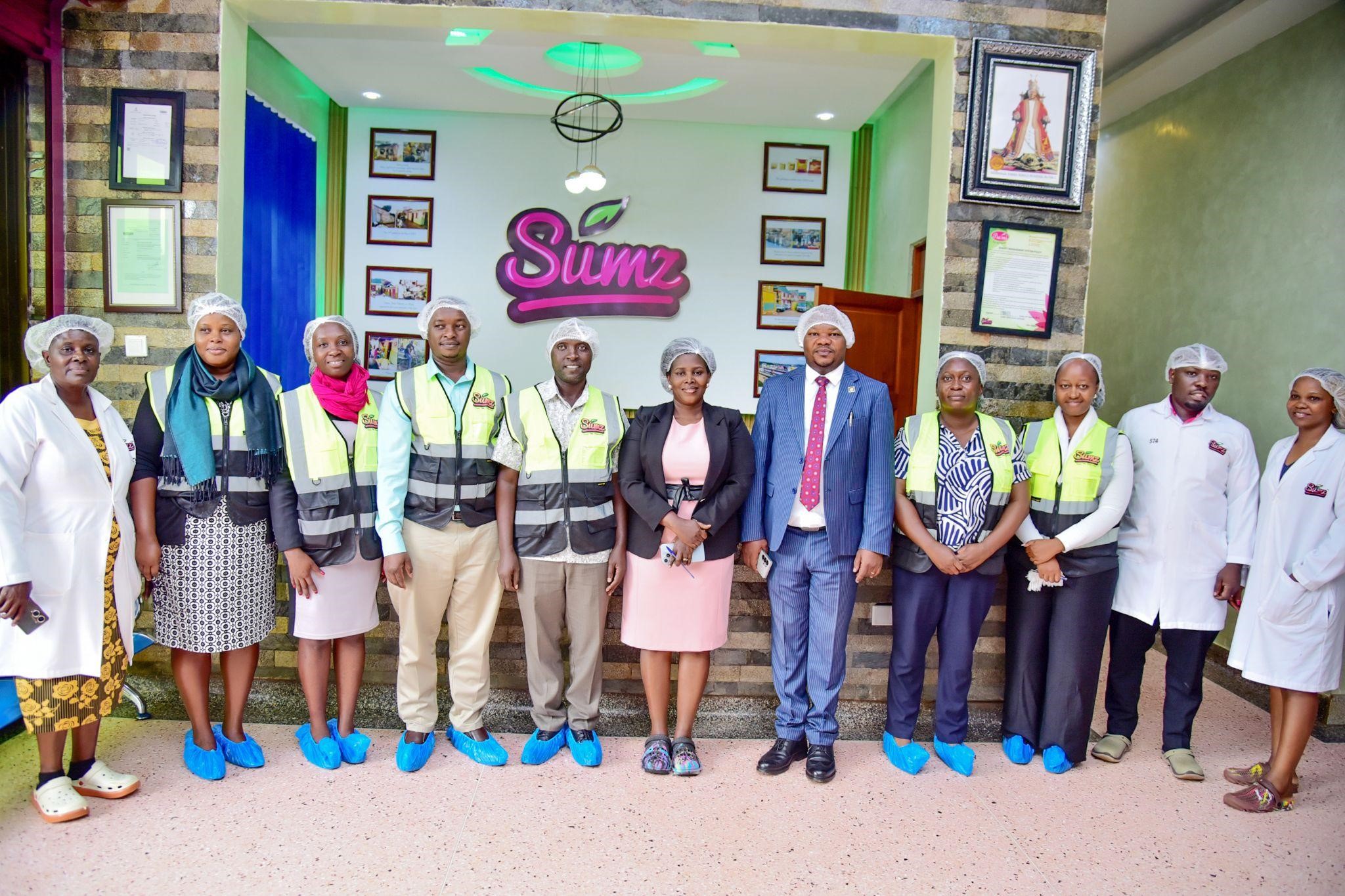
On 2nd March, 2026, representatives from the Advancement Office, the College of Business and Management Sciences and the University Innovation Pod visited Psalms Food Industries to discuss a prospective partnership aimed at strengthening university–industry collaboration in manufacturing, research, innovation, and skills development.
Psalms Food Industries, a homegrown snacks innovation and manufacturing company, operates three major brands, namely, Sumz, Afrikan Harvest and Krunchables, which have grown to a range of 37 products and target the introduction of five new products annually. The company distributes products across Kenya, Rwanda, the Democratic Republic of Congo, South Sudan, and, recently, Tanzania. As a labour of love, the idea of producing snacks was born during the honeymoon of Mr and Mrs Ngabirano, who now run Psalms Food Industries side by side.
Dr. Denis Ngabirano, CEO and Co-Founder of Psalms Food Industries, during the meeting, described the company as “a snacks innovation house, with all our products developed in-house.” He noted.
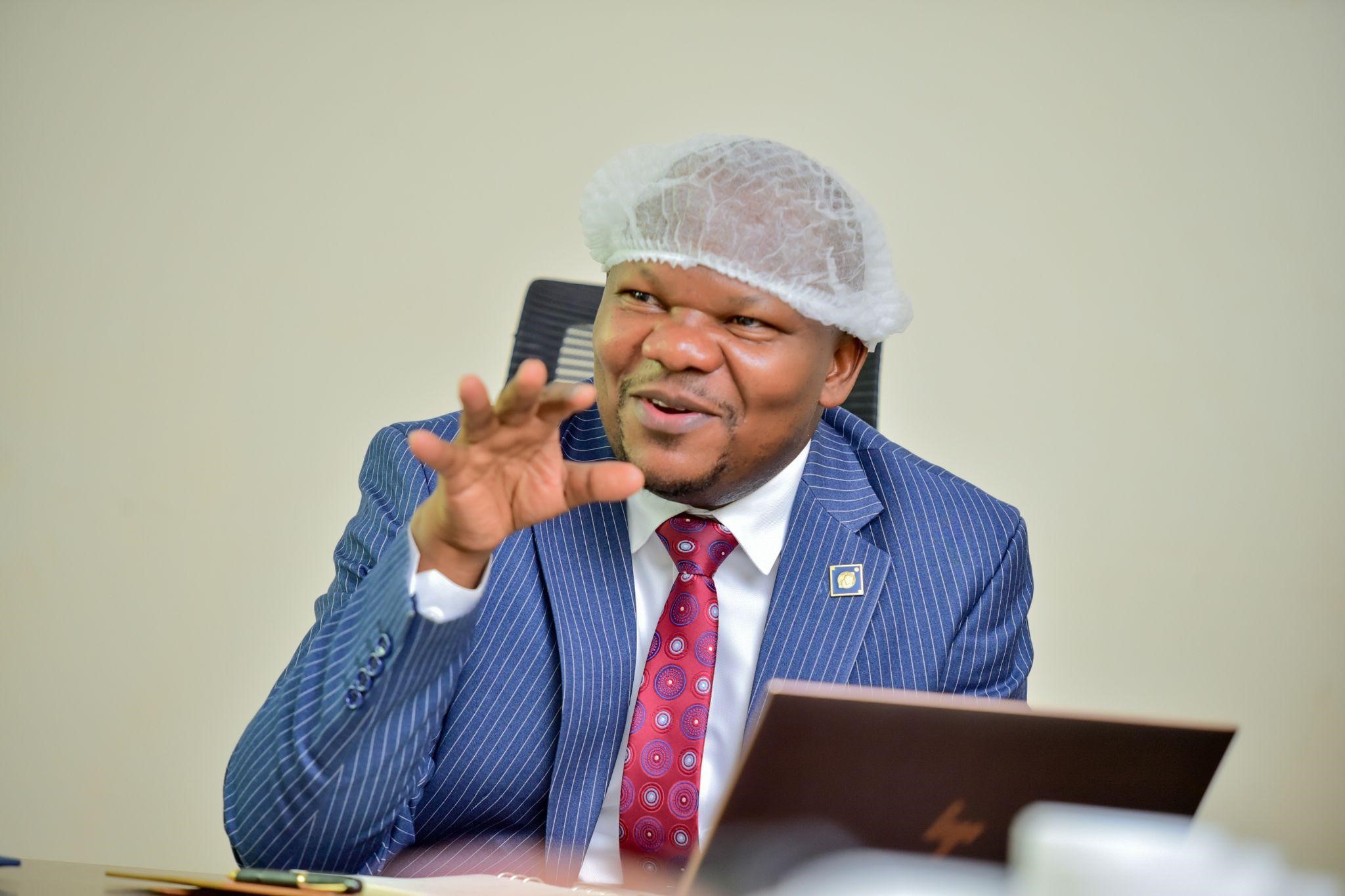
He emphasised the company’s commitment to quality assurance and consumer-centred research, noting that Psalms conducts surveys and gathers customer feedback to inform product development, supported by an internal microbiology and chemistry laboratory.
Dr. Denis Ngabirano noted that the company had only recently introduced two brands, “Afrikan Harvest for it’s health conscious clientele and Kruchables for it’s volume centric clientele.
“Afrikan Harvest has no additives, it is a brand for health-focused consumers,” he explained, while highlighting the differentiated positioning of their product lines. “Sumz is our premium brand, and Krunchables focuses on volume.”
Student-Centered Experiential Learning
A key focus of the meeting was structured experiential learning for students across disciplines. Potential areas of collaboration include internships, graduate trainee pathways, and hands-on exposure within Psalms’ incubation and production facilities.
The proposed engagement spans multiple fields, including environmental sciences, engineering, procurement and logistics, finance and accounting, quality control, production and manufacturing, human resource management, marketing, and international business.
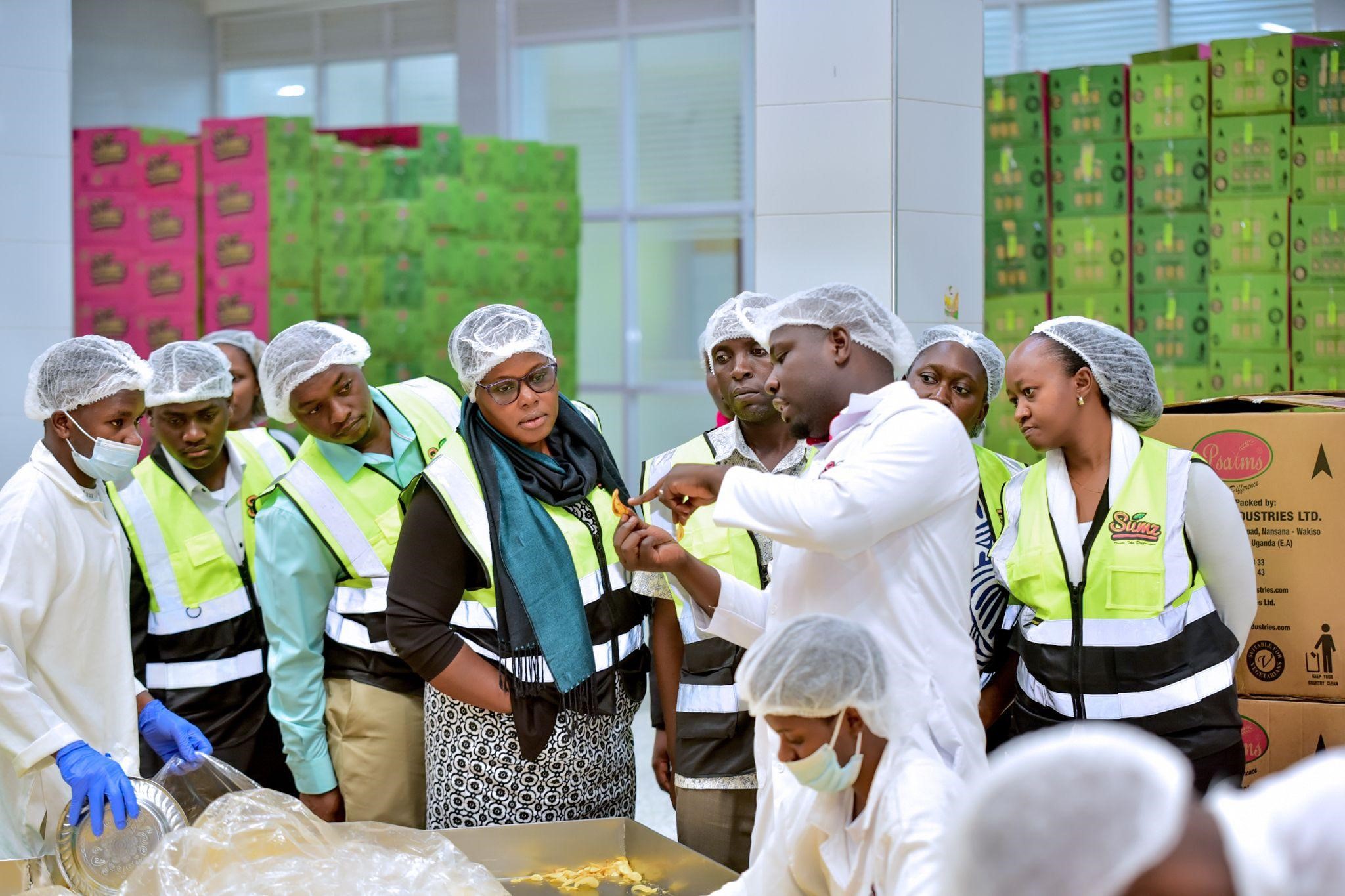
The partnership could provide students with direct exposure to real-time production systems, standard operating procedures (SOPs), and quality assurance frameworks, strengthening the practical relevance of their academic training.
Among the innovative ideas discussed was a potential competition involving students from the Fine Art and Industrial Design disciplines to redesign packaging for selected Sumz products. The proposal would allow top designs to be commercially adopted, creating a direct bridge between creativity, intellectual property development, and industrial application.
Research, Innovation and Commercialisation
Both institutions expressed interest in joint applied research initiatives, particularly in process optimisation, data analytics for manufacturing efficiency, product improvement, and sustainable production systems.
Opportunities were also discussed around collaborative research in machine design, crop development for snack processing, and factory energy solutions, areas that not only benefit Psalms but have broader implications for Uganda’s manufacturing sector.
The engagement further highlighted potential linkages with the University’s innovation and commercialisation structures, including the University Innovation Pod (UNIPOD), to support co-creation and scaling of student-led innovations.
Mr Awel Uwihanganye, Chief Advancement Officer at Makerere University, proposed strengthening the engagement through structured programming, including a planned collaboration between the University’s innovation Hub and the upcoming incubation Hub at Psalms Food Industries, particularly to support the commercialisation of research outcomes for both students and staff.
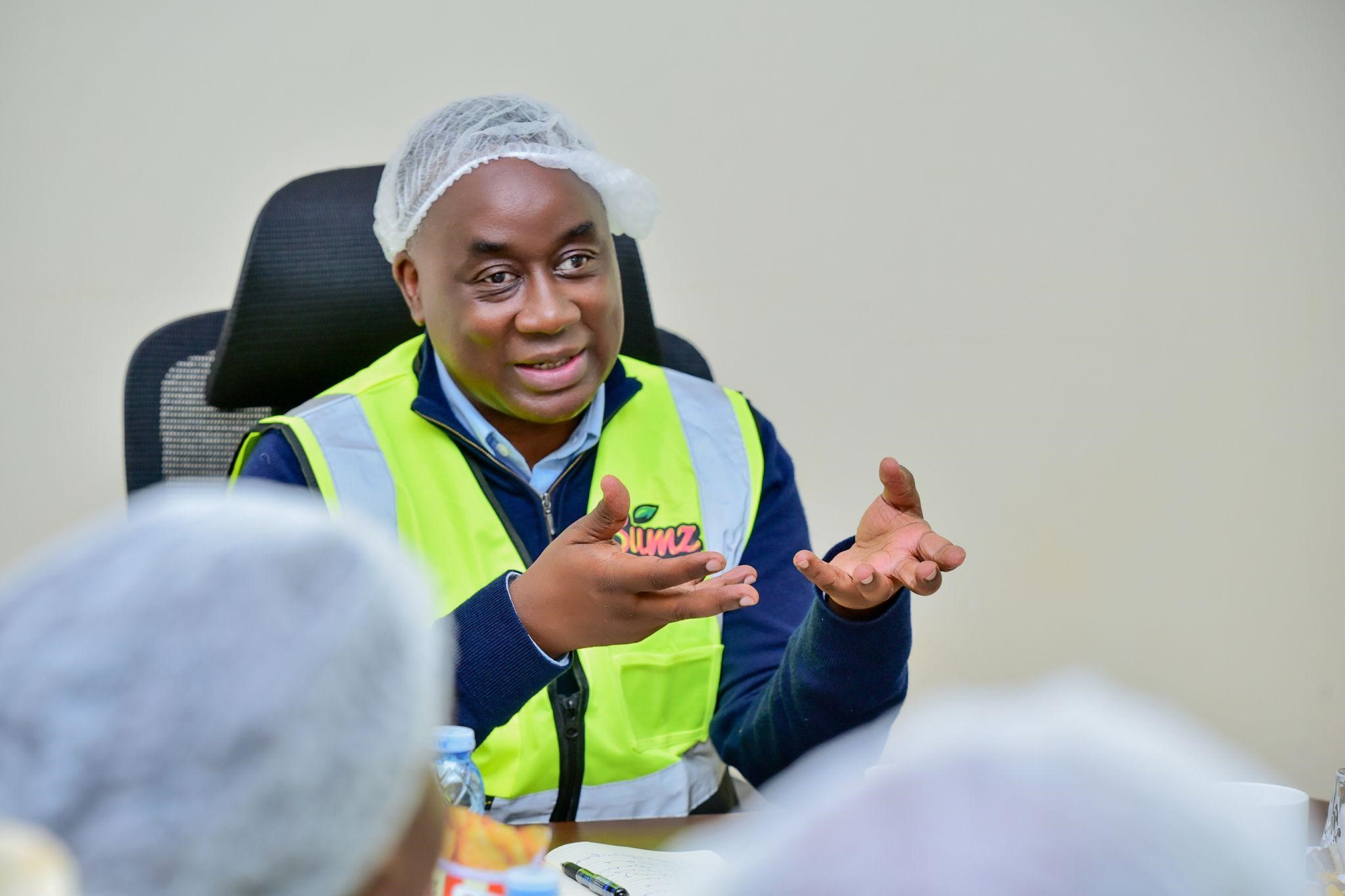
Curriculum Co-Creation and Staff Exchange
Beyond student placements, discussions also focused on co-developing academic content that responds more directly to industry needs, particularly within the manufacturing value chain.
Proposals included guest lectures by industry practitioners, staff exchange programmes to expose academic staff to factory operations, and tailored short courses for Psalms staff based on identified skills gaps.
Dr. Jude Mugarura, Head of the Department of Marketing and Management at COBAMS, emphasised the importance of embedding the partnership within academic programming. He proposed “internships for students in HR, marketing, international business, accounting and finance,” as well as staff exchanges to give University staff hands-on exposure to manufacturing operations.
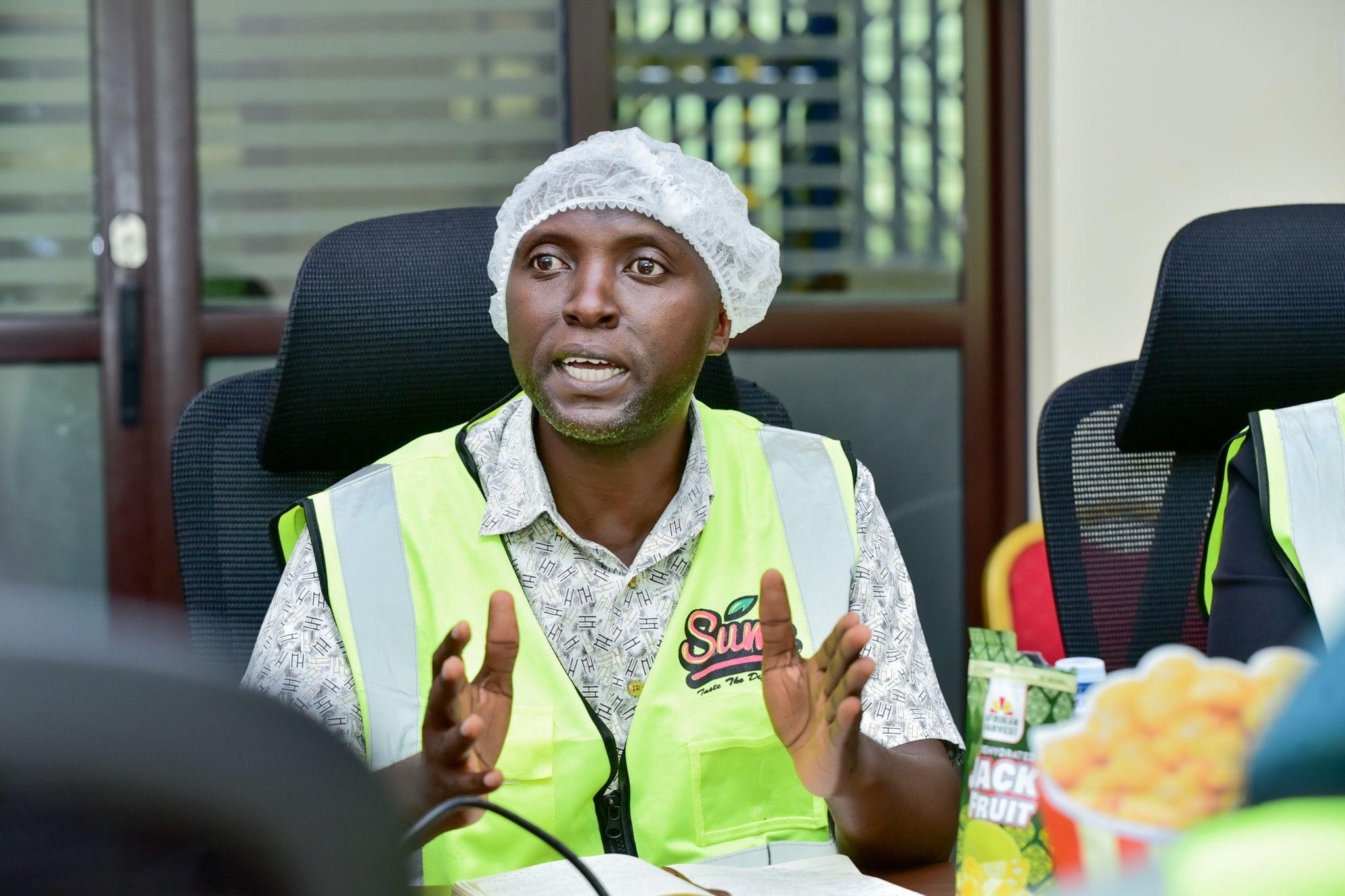
He further suggested specialised courses tailored to the factory’s needs and attachment of research students interested in manufacturing. Such collaboration would contribute to curriculum responsiveness and ensure that graduates are equipped with market-relevant competencies.
Strengthening University–Industry Linkages
The engagement reflects Makerere University’s continued commitment to strengthening partnerships that bridge knowledge generation and real-sector application.
Both institutions expressed a shared vision of building a structured, mutually beneficial collaboration that integrates research, innovation, skills development, and enterprise growth, positioning the University as a key knowledge partner in Uganda’s manufacturing transformation.
Discussions remain ongoing as both parties refine priority areas for formalisation.
Caroline Kainomugisha is the Communications Officer, Advancement Office.
General
Makerere University commemorates 13 transformative years of partnership with Mastercard Foundation
Published
3 days agoon
March 2, 2026
On Friday, 27th February 2026, Makerere University proudly celebrated 13 years of a significant partnership with the Mastercard Foundation, a prestigious independent organisation headquartered in Toronto, Canada. Since its inception in 2013 with the launch of the Scholars Program-currently headed by Prof. Justine Namaalwa, this collaboration has grown significantly, expanding to include two additional initiatives: The E-learning Initiative-headed by Prof. Paul Muyinda Birevu and the Africa Climate Collaborative-headed by Prof. Gorretie Nabanoga. This long-term partnership underscores the shared commitment to fostering education, innovation, and sustainability in Uganda and across Africa.
The colourful event coincided with the 76th Graduation Ceremony, during which Makerere University honoured Ms. Reeta Roy, the Founding President and CEO of the Mastercard Foundation, with an honorary Doctor of Laws.

In her commencement speech, Ms. Roy thanked Makerere University for considering a partnership with the Mastercard Foundation and for conferring upon her a prestigious honorary award.
“Mastercard Foundation is honoured to collaborate with this esteemed university, and I appreciate the recognition through this award. I am excited to be associated with Makerere University and look forward to actively embodying its values. Joining the broader community of alumni from this distinguished institution is a privilege, and I am eager to contribute to its legacy,” stated Ms. Roy.

During the reception in honour of Ms. Roy, the Chairperson of Makerere University Council, Dr. Lorna Magara, acknowledged the invaluable support from the Mastercard Foundation. She emphasised the profound impact of the Foundation’s various initiatives, particularly the scholarships for disadvantaged youth, which enable them to access higher education and opportunities that might have otherwise been beyond their reach.
“On behalf of the Makerere University Council and the broader University community, I extend our sincere gratitude to Mastercard Foundation for its commitment to collaborating with Makerere University in various endeavours, especially for providing scholarships to our underprivileged young people who would never have stepped inside a lecture room at the University.” Dr. Magara stated.

Dr. Magara, in a special way, thanked Ms. Roy for her transformative leadership and unwavering commitment to supporting young people in Africa, citing her efforts to ensure young people get their voices heard.
“As a university, our business is with young people. We are therefore committed to providing the environment and education that deliver meaningful pathways. We will provide an environment that ensures young people have a voice and agency to create meaningful change in society.” Dr. Magara pledged.

Dr. Magara further congratulated Ms. Roy on her honorary Doctor of Laws from Makerere University, noting that it is the university’s highest honour for individuals who have excelled in their careers.
“On behalf of the Makerere University community, I would like to extend my heartfelt congratulations on your honorary Doctor of Laws. This esteemed recognition represents the highest honour our institution can bestow on individuals who have demonstrated exceptional achievement and excellence across various facets of their career.” Dr. Magara remarked.
Prof. Justine Namaalwa, the Program Director of the Mastercard Foundation Scholars Program and the Coordinator for all Mastercard Foundation Initiatives at Makerere University, expressed her appreciation for the thirteen-year collaboration between Makerere University and the Mastercard Foundation. She highlighted that the partnership had yielded significant, impactful results.

“In 2013, Makerere University partnered with the Mastercard Foundation to educate the next generation of transformative African leaders who can positively impact their lives, their communities, and the economies of Africa. The partnership has had a significant impact. I thank the University Management and the Foundation team for this visionary collaboration,” remarked Prof. Namaalwa.
Prof. Namaalwa articulated that the partnership with the Mastercard Foundation is primarily focused on empowering young people as agents of change for transformational leadership in Africa. She presented compelling statistics demonstrating the positive impact of the scholars’ program, highlighting the success of individuals who have completed their education and their subsequent professional experiences after university graduation.

“This partnership focuses on young people, aiming to create positive change in their lives. To date, the Scholars Program has graduated 974 alumni, with 48% securing formal employment, 18% starting their own businesses, 8% participating in internships, and 5% pursuing further education. Overall, 72% of Scholar alumni are actively engaged in employment or entrepreneurship,” Prof. Namaalwa stated.
The colourful event showcased a dynamic array of activities that highlighted the entrepreneurial spirit of Scholars and alumni from the Mastercard Foundation at Makerere University. Attendees enjoyed a mini-exhibition featuring innovative products from these ventures.

A video documentary illustrated the positive impact of the three Mastercard Foundation initiatives. The event also featured inspiring poetry recitations by Scholars and a lively atmosphere of music and dance, creating an engaging and memorable experience for all participants.
The high-level event was attended by senior University officials, led by the Chairperson of Council, Dr. Lorna Magara; the Vice-Chancellor, Prof. Barnabas Nawangwe; the Vice-Chancellor, Academic Affairs, Prof. Sarah Ssali, Deputy, and the Ag. Deputy Vice-Chancellor, Finance and Administration Prof. Winston Tumps Ireeta. Mr Yusuf Kiranda, the University Secretary; and Prof. Buyinza Mukadasi, the Academic Registrar, Chancellor Emeritus-Prof. Ezra Suruma, former Chairperson of the Steering Committee of Mastercard Foundation Scholars Program-Prof. Umar Kakumba, and the Deputy Executive Secretary, RUFORUM, and former Program Coordinator of the Scholars Program at Makerere University-Dr. Florence Nakayiwa, among many other officials graced the function.

The event was also graced by a high-level delegation from the Mastercard Foundation, led by Ms. Reeta Roy, the Founding President of the Foundation, and included the Mastercard Foundation Teams from the Country offices in Kigali, Nairobi, and Kampala; the Program partners; the Mentors, Scholars and alumni; as well as the Program staff of the three Mastercard Foundation Initiatives at Makerere University.
At the end of the event, Makerere University honoured Ms. Reeta Roy with University memorabilia, including a pencil-drawn portrait, a pencil-drawn photo of the Ivory Tower, and other Ugandan crafts. Ms. Roy cut a graduation cake together with the 10 graduates of the 76th graduation ceremony from the Mastercard Foundation Scholars Program.
Bernard Buteera is the Principal Public Relations Officer for the Mastercard Foundation Scholars Program at Makerere University.

It is with great pleasure that I welcome you to this edition of Mak News Magazine, a publication that continues to chronicle Makerere University’s journey as a centre of academic excellence, innovation, and societal transformation.
The stories featured in this issue vividly demonstrate Makerere’s unwavering commitment to addressing national, regional, and global challenges through research, partnerships, and people-centred solutions. They reflect a university that is deeply engaged with society, one that applies knowledge not only to advance scholarship, but also to improve lives.
A recurring theme in this edition is innovation for resilience and inclusion. From the College of Agricultural and Environmental Sciences’ Healthy Soy Initiative combating child malnutrition amid climate change, to the cutting-edge work of CEDAT’s Team Green Minds integrating IoT into agriculture, Makerere continues to harness science and technology to respond to pressing development needs. Equally inspiring is the College of Natural Sciences’ success in securing international funding to scale up fish processing technologies, with a deliberate focus on empowering women and strengthening livelihoods.
This issue also highlights Makerere’s growing role in advancing health and wellbeing. The launch of the Early Intervention Psychiatry Services Clinic at Makerere University Hospital marks an important step in strengthening mental health services, while the Hospital’s transformation from a modest sickbay into a centre of excellence stands as a testament to decades of strategic investment, dedication, and service to the nation.
Our commitment to education access and global engagement is equally evident. Strategic partnerships, such as that between the College of Education and External Studies and the Uganda Vocational and Technical Assessment Board, are expanding pathways to quality education. The establishment of the first-ever United States Studies Centre in the Great Lakes Region positions Makerere as a hub for dialogue, research, and policy engagement on global affairs. We also celebrate our vibrant international community, with graduates drawn from 67 nationalities—affirming Makerere’s status as a truly global university.
This edition further showcases initiatives that ensure long-term institutional sustainability, including the launch of the CoCIS Endowment Fund, infrastructure developments such as the modern hostel at Buyana Farm, and transformative programmes supported by the Mastercard Foundation that continue to empower young people across the continent.
As you read through these pages, I invite you to reflect on the collective effort of our students, staff, alumni, partners, and supporters whose contributions make these achievements possible. Together, we continue to shape Makerere University as a place where knowledge serves humanity.
I wish you an engaging and inspiring read.
Prof. Barnabas Nawangwe
VICE CHANCELLOR
Trending
-

 Humanities & Social Sciences1 week ago
Humanities & Social Sciences1 week agoMeet Najjuka Whitney, The Girl Who Missed Law and Found Her Voice
-

 General1 week ago
General1 week ago76th Graduation Highlights
-

 Agriculture & Environment2 weeks ago
Agriculture & Environment2 weeks agoUganda Martyrs Namugongo Students Turn Organic Waste into Soap in an Innovative School Project on Sustainable Waste Management
-

 Health2 weeks ago
Health2 weeks agoMakerere University School of Public Health Graduates First Cohort of Cost-Effectiveness Analysis Short Course
-

 Agriculture & Environment1 week ago
Agriculture & Environment1 week agoCAES Presents Overall Best Performing Student in the Sciences & a Record 28 PhDs at the 76th Graduation Ceremony
